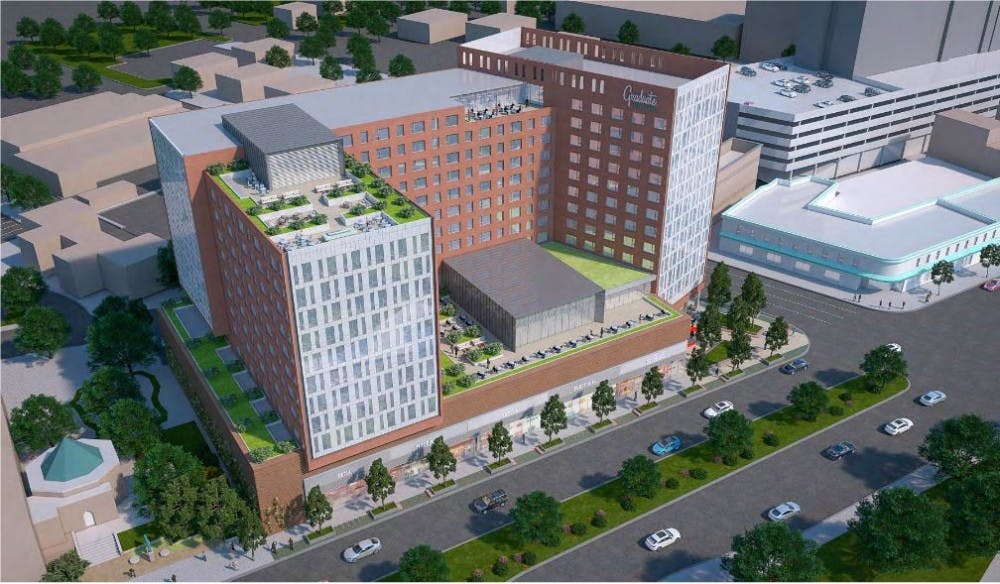The East Lansing City Council unanimously approved the site and brownfield plans for the latest iteration of the Park District project at their Tuesday night meeting, moving the long-awaited development one step closer to tangible action.
Should all proceed as planned, the blighted buildings that have stood on West Grand River Avenue for more than a decade might begin demolition as soon as this summer.
The passed and potentially final site plan is relatively unchanged from the most recently reported plan. The centerpiece is a 13-level building with first floor retail, two stories of parking, 150 hotel rooms and 197 apartment units.
Another five-story building featuring owner-occupied condominiums and two levels of parking will be built on Evergreen Avenue. Several public infrastructure improvements will be made between the two buildings, including the construction of surface parking lots on city-owned properties on Evergreen.
The total cost of the project is estimated at about $154 million, but the city is only liable to reimburse just less than $20 million through the passed brownfield plan.
A brownfield plan details out terms for tax increment financing, commonly referred to as a TIF, which reimburses the developer for public improvements completed as part of the development by giving them a percentage of the development’s property tax revenue over a period of time.
The project's brownfield plan calls for a TIF of approximately $19.5 million dollars in total reimbursement, to be provided through capturing 80 percent of the development’s property taxes through 21 years. The remaining 20 percent will go to the city, which totals an estimated $194,835 in annual tax revenue during the capture period.
Council also voted unanimously to give Mayor Mark Meadows permission to sign a “memorandum of understanding” with the developer, who now refer to themselves as 100 Grand River LLC and 341 Evergreen LLC in the documents.The memorandum, which outlines the main points of a development agreement, was a late addition to the agenda. Meadows said the memo was being deliberated until 6 p.m. that night.
“The development agreement is about 50 pages long and it has many, many many paragraphs in it, so the memorandum of understanding was to take the most contentious issues and resolve them so that we can get the rest of the agreement done,” Meadows said.
David Pierson, attorney for the developer, said he expects the city and developer to reach a development agreement within the next two weeks; Meadows said he wants to get it done in the next three to four days.
If a development agreement is reached, the last remaining hurdle to the project will be the approval of a $10 million Michigan business tax credit the developer has long pursued and cited as reasoning to leave up the blighted buildings during the approval process.
If the credit is approved, which Pierson said will happen at the June meeting of the Michigan Strategic Fund Board at its earliest, external demolition of the buildings will begin 10 days later. Other preparations, such as asbestos removal, can begin before approval, Pierson said.
Despite the all parties being satisfied with the agreement, the developer might decide to not go forward with the project should the tax credit be denied, Meadows said. However, the buildings will be demolished regardless, but not necessarily as quickly, he said.
A dispute regarding refinancing terms sank the last incarnation of the project in January, but this time the city and the developer appear to be on the same page. Pierson said he is confident about the project in its current form and that it is a project the city wants.
“I feel like we went back to the negotiating table and we came up with something that I think will go forward,” Meadows said.
Mayor Pro Tem Ruth Beier, an often-vocal critic of many steps taken during the development process, was beaming from ear-to-ear. Beier said the developer had been very easy to work with, and she was overjoyed the project included the refinancing of debt owed by the city’s Downtown Development Authority on several properties along Evergreen Avenue.
The $5.6 million debt would have bankrupted the DDA and has been hanging over the city’s head for years, but now they have a way to creatively ease that burden, Beier said.
“I can’t tell you how happy I am,” Beier said. “I was really sad and upset that the last deal fell apart. I think it had too much in it, it had too much risk, it had a big parking ramp we didn’t need and now we have a project that’s reasonably sized, it’s two buildings, one that’s owner-occupied. It doesn’t have a six-story parking ramp, it has just the parking it needs. It’s going to give us a 'happening’ hotel. The parking’s going to be hidden, it’s going to be pretty. I don’t think I could’ve designed a better project if I were in charge completely.”
Some community members voiced their support for the project earlier in the meeting, including representatives from The Peoples Church, which directly neighbors the development.
“The congregation is delighted to see some movement here, and especially the developer of this last period, they have been outstandingly communicative with us,” Rev. Andrew Pomerville, senior pastor at The Peoples Church, said. “They’ve been very responsive to our concerns (and) our comments, and I want to give them a lot of credit for that, for trying to be good neighbors already. We’re delighted to see the connection to downtown again.”
Support student media!
Please consider donating to The State News and help fund the future of journalism.
Discussion
Share and discuss “End might finally be in sight for Park District project after new plans approved” on social media.







